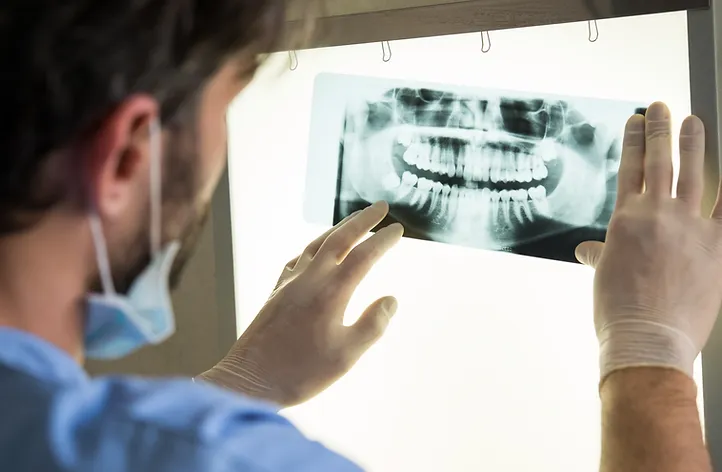Dental Extractions
Sometimes, even with the most heroic efforts, teeth need to be taken out. This can be due to large cavities that cannot be fixed with fillings or crowns, fractures (particularly they extends to the root surface), impacted wisdom teeth, bone loss or related periodontal disease, to assist with orthodontics, or to help baby teeth that have trouble exfoliating on the their own. It’s also possible, depending on the shape of a patient’s jaw and growth patterns, that wisdom teeth may need to be extracted due to lack of space and hard or soft tissue impaction.

How and when are extractions treatment planned?
Many times extractions are needed at emergency dental appointments, but this isn’t always the case. With every extraction, our dentists will take a digital radiograph or X-ray and review your medical and dental history in-depth with you.
Dr. Janowski or Dr. Curtin will then perform a thorough dental examination to check the health of your teeth and diagnose any cavities, infection, bone loss or fracture. They will check the oral tissue as well as adjacent teeth and review with you options for replacing your teeth once it’s been taken out. This can be in the form of a denture, a bridge, or an implant. Sometimes patients opt not to replace extracted teeth, and our doctors can discuss this with you and determine what course of action will work best for you.
It’s only natural to be nervous about oral surgery. But extractions at our office are done with the patient’s comfort as a top priority. Dr. Curitn has extensive experience performing dental extractions and the procedure is done with finesse, care, and a gentle touch.
What's the extraction process like? Is it painful
Dental extractions begin by a blood pressure check and review of health history and medications. Our doctors will numb the area of your mouth where the extraction will be performed. Prior to extracting your tooth, our doctors will ensure all the surrounding area and the tooth itself is completely comfortable. Using specialized instruments, the doctor will then loosen the tooth from the surrounding ligament before applying pressure to remove the tooth in tact. Sometimes, depending on the surrounding bone or other factors, a tooth may be sectioned using a high speed hand piece before being extracted in smaller pieces.
Depending on the complexity of the extraction, a patient’s health, as well as other factors the dentist may elect to re-shape the bony socket of the extracted tooth or place sutures or medicine the extraction site to aid in healing. If the dentist is extracting multiple teeth at one visit, there is an increased likelihood of placing sutures. Sutures help to hold the tissue in place as the healing process occurs and our doctors normally place sutures that dissolve so there is no need to remove them at a second visit.
What post-op instructions should I follow after my dental extraction?
Following some easy steps after an extraction stream-line the healing process and insure that you’ll feel better as soon as possible. The doctor will prescribe any pain medicine or additional medication they deem appropriate to assist with your healing.
These guidelines include:
- No smoking, chewing tobacco, or alcohol
- No spitting or straw usage
- Eat soft foods and avoiding chips, nuts, or foods that are difficult to chew. Cold foods such as ice cream, smoothies, noodles, and yogurt are good options.
- Limit exercise in the few days directly following an extraction
- Utilize gauze pressure on the extraction site for an hour after your appointment. If bleeding continues, replace gauze for an additional hour.
- Use cold compresses on the side of your face where the extraction took place
- Take care not to bite yourself as the anesthetic dissipates. This is especially important for children who may
- Attend follow-up visits scheduled by your dentist and taking medication as prescribed
- Expect some bruising, minor swelling, and post-op pain. Excessive bleeding or swelling is not normal and should be followed by direct contact with your dentist or if severe, ER follow-up.
- Use care when cleaning your mouth following extractions. Brushing and flossing are discouraged the day of the extraction but can be resumed on the day following. Do not aggressively cleansed or disturb the site of the extraction as this may disrupt normal healing.
- Complications with extractions at our office are very rare and can be minimized with excellent post-op care. If you experience anything out of the ordinary or have questions following your procedure, simply reach out to our office. Our doctors will be happy to answer your questions and perform follow-up care when needed.




